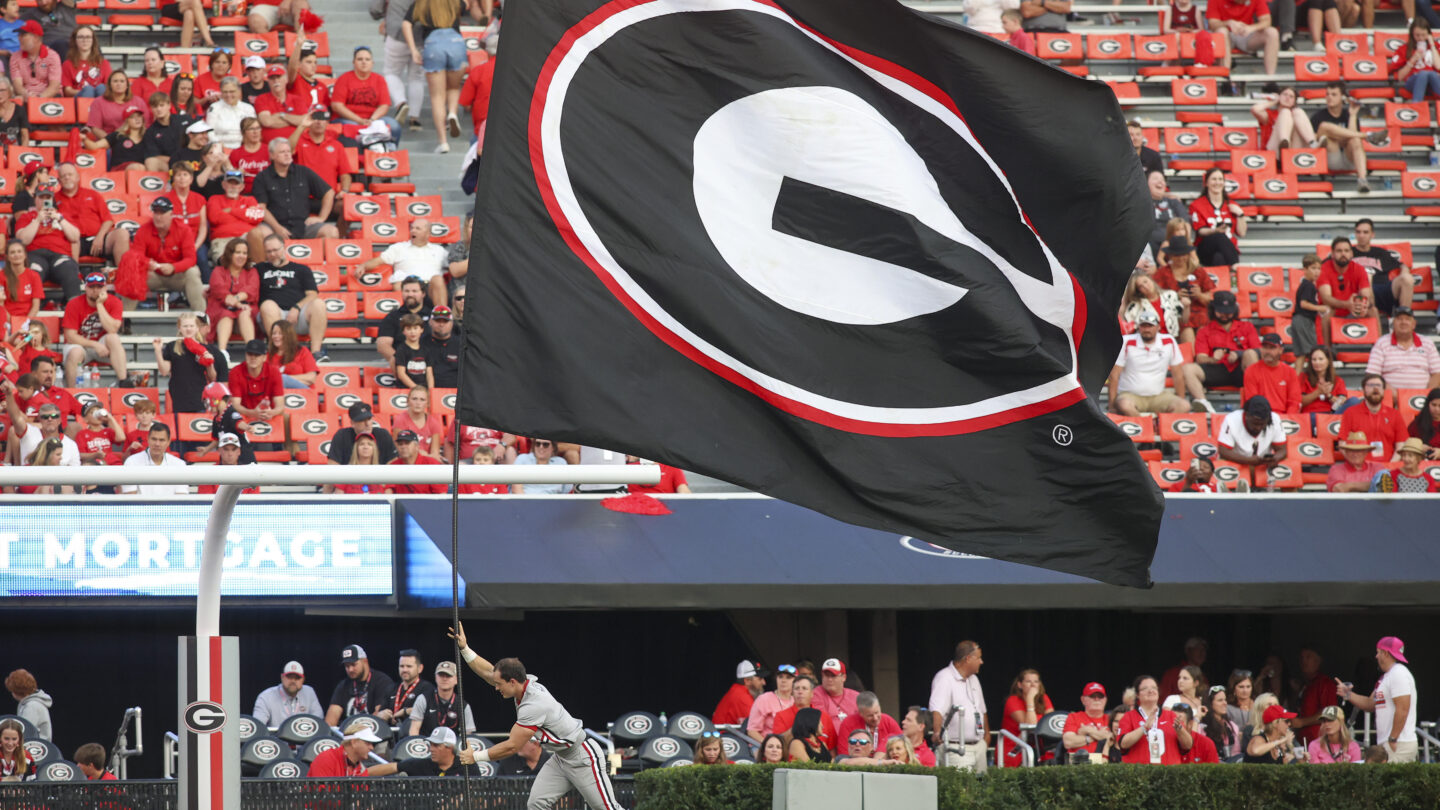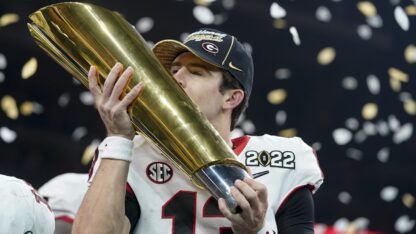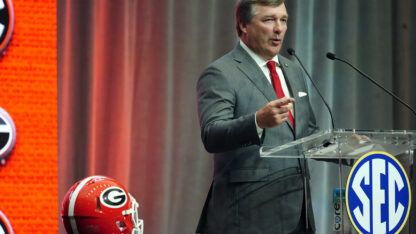Dressed for success in sports jackets, suits and even some ties, the Georgia football team starts the pregame Dawg Walk 2 hours and 15 minutes before kickoff on game days.
The quarter-mile stroll from Lumpkin Street into Sanford Stadium, lined on each side with cheering fans and the Redcoat Marching Band, is a 21-year-old tradition but the Bulldogs’ attire is relatively new.
Not long ago, the players would do the Dawg Walk in their uniforms, carrying their shoulders pads and helmets, because there was no good place to change at the stadium. The old locker room was more like a concrete storage space. It didn’t even have lockers.
Now the ‘Dawgs arrive at a 5,400-square foot locker room, part of a $63 million renovation that also included a 10,000-square foot recruiting lounge one floor up.
“They got it good right now, I ain’t gonna lie,” said D.J. Shockley, who played quarterback for Georgia from 2001-05 and currently covers the team as a sideline reporter and local television anchor.
Over the last seven years, Georgia football has been transformed. No longer satisfied with being an occasional national championship contender and chasing Alabama in the Southeastern Conference, leadership at the school decided to go all-in in a way Georgia had never done before.
It wasn’t just about hiring a new coach, though after eight years as Nick Saban’s first lieutenant with the Crimson Tide, Georgia alumnus Kirby Smart was the perfect person for the job. With Smart came a plan to unlock a potential juggernaut that called for a change in philosophy and hundreds of millions of dollars.
“They always had the money here. It’s just how it was allocated. You had to work at it to get it,” former Georgia coach Jim Donnan said.
Reaping the returns of its investments, Georgia beat Alabama to win its first national title in four decades last season and the Bulldogs enter Saturday’s showdown with No. 2 Tennessee as the top-ranked team in the country and a favorite to repeat as champions.
“When you have an institutional commitment and a great coach, I think that leads to the success that we’re now having,” Georgia President Jere Morehead told AP last month before the Bulldogs beat Auburn 42-10.
Georgia has a long history of football success. There were Rose, Sugar and Orange bowl victories in the 1940s and late coach Vince Dooley’s quarter-century run included six SEC titles and the 1980 national championship with star tailback Herschel Walker.
Former Georgia coach Mark Richt recalled a conversation he had while he was still an assistant at Florida State with then-Seminoles linebackers coach Joe Kines.
“Somehow the subject of Georgia came up and he said, ‘That place is a gold mine,'” Richt said. “And you know, I think it’s a pretty good, telling statement about what’s happening right now.”
Richt spent 15 years as the top ‘Dawg in Athens, leading Georgia to nine double-digit-win seasons, five SEC title game appearances, two conference championships and three top-five finishes in the AP poll from 2001-15.
If there had been a four-team College Football Playoff in place during Richt’s tenure, the Bulldogs might have snapped that national title drought years sooner and who knows what would have followed at Georgia.
For years, Richt pined for — though didn’t necessarily push for — an indoor facility that could accommodate a full practice so the Bulldogs could escape the rain or sweltering heat. Ground was finally broken in February 2016 — about a month after Smart moved into his new office.
Donnan, who preceded Richt, said in the past Georgia wanted to see results before it made big investments. Now, the school’s leadership understands it needs to spend on the front end to be the very best.
“For me and Richt, it was more, ‘Hey, you do it, and then we’ll get it.’ As compared (with) Kirby it was ‘Hey, we’re gonna get it and you go ahead and do it,'” Donnan said.
Having been inside Alabama’s championship machine, Smart returned to the place he played with a vision to recreate a version of it in Athens. The day after Alabama won the 2015 SEC championship, Smart met with then-Georgia athletic director Greg McGarity in Atlanta.
“We talked about what it would take to, I called it, go big,” McGarity said.
Georgia needed to bulk up its staffing on the recruiting and player personnel side and it has. In 2019, Georgia spent $3.6 million on football recruiting, most in the nation.
The school would also need to commit to paying top salaries for assistant coaches.
“You can’t win the SEC unless you can compete for the best coaches,” said Smart, whose latest contract extension through the 2031 season is worth more than $110 million. “The best coaches get the best players, and you got to be able to compete at the salary level, which they were comfortable doing.”
Georgia also needed to step up its facilities. Knowing the indoor practice facility was on its way gave Smart confidence more would follow.
“I think winning brings an opportunity to build facilities. But the facilities allow you to win and so I always use the chicken-and-egg theory. Which came first? A lot of people want to see you win before they commit the money,” Smart said.
After a mediocre first season under Smart in 2016, Georgia took off in 2017, playing for the national championship and losing in overtime to Alabama. It created an opportunity to tap into renewed enthusiasm among the school’s many boosters.
“I think five years ago, we had about 30-some-odd donors who had pledged a million dollars and now we’re up over 100,” Georgia AD Josh Brooks said. “We built … over $200 million worth of facilities with zero (long-term) debt taken on during that time.”
Smart’s Georgia roots and deep ties to the university have helped rally support.
“What they needed was somebody to come in and kind of bring everybody together,” said Smart, who is 74-15 overall at Georgia and 45-9 in the SEC. Only Saban’s 50-5 mark over that period is better in America’s toughest college football conference.
Smart’s blueprint was inspired by his old boss, but he said he didn’t come home to turn Georgia into Alabama East.
“It wasn’t sold as this is the way they do it. I would never approach it that way because I think that lessens it,” Smart said. “And I wanted to make it more about the university that I went to and what we do.”
A case could be made that right now, nobody in college football is doing it better than Georgia.
Follow Ralph D. Russo at https://twitter.com/ralphDrussoAP and listen at http://www.appodcasts.com
More AP college football: https://apnews.com/hub/college-football and https://twitter.com/AP_Top25. Sign up for the AP’s college football newsletter: https://bit.ly/3pqZVaF









